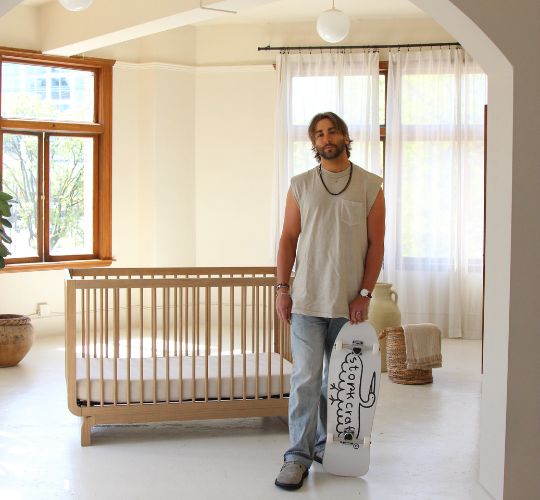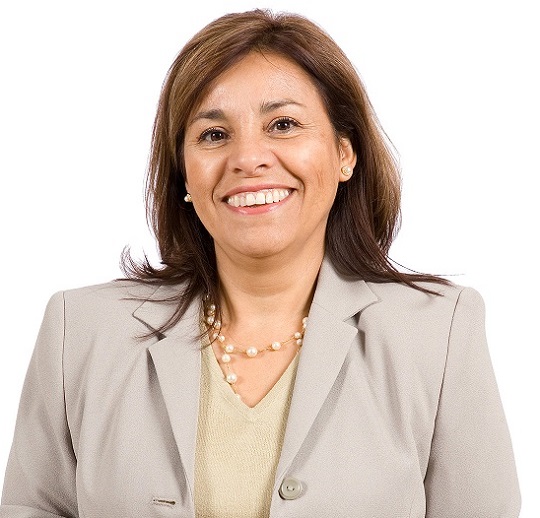Expanding to Mexico: Storkcraft designs a global strategy
Storkcraft expands to Mexico and beyond with EDC’s support and business advisory services.

In this article:
- How Storkcraft evolved from local sales to a global export brand
- Finding market fit: Storkcraft’s strategy for expanding to Mexico and beyond
- EDC provides trustworthy information for market entry
- How EDC supports Canadian exporters: Credit insurance and advisory services for Mexico expansion
- Managing global supply chains while expanding to Mexico
- Meeting global demand for innovative baby furniture: Strokcraft’s vision for Mexico, Latin America and beyond
- What’s next for Strokcraft: Innovation and ambition that extends beyond borders
Choosing a crib and furnishing the baby’s room are highlights on the journey to parenthood for many moms- and dads-to-be.
The emotion behind nursery decor is something brothers Adam and Justin Segal understand deeply. Both fathers in the thick of parenting young children, the leaders of Stork Craft Manufacturing, Inc. (known as Storkcraft) lean on this experience to guide their growing business.

Brothers Adam (left) and Justin Segal are leading Storkcraft into new global markets.
“We’re real parents, and we bring this authentic perspective to the office on a daily basis to bring the best products to life for families,” says Justin, the company’s vice-president of product and brand.
From their hand-sketched product designs to their hands-on efforts to make Richmond, BC-based Storkcraft the fastest-growing baby and children’s furniture company in North America, the Segals are reshaping the 80-year-old company to meet the needs and tastes of today’s families. It’s a vision that’s far too big for one market.
“We want to go international,” says Adam, Justin’s older brother and president and CEO of Storkcraft since 2017.
Recently, the company expanded to Mexico, a growing market where Canadian businesses are given preferential access through the Canada-United States-Mexico Agreement (CUSMA). And they’re not stopping there.
Storkcraft’s market diversification strategy is a smart move for an exporter traditionally focused on the United States. But it comes with challenges, given the intricacies of the market and the children’s furniture sector, which is subject to strict product compliance rules, safety standards and recall regulations. Storkcraft is meeting them with the support of Export Development Canada (EDC).
How Storkcraft evolved from local sales to a global export brand
Founded in 1945, Stork Craft International, Inc. was purchased by the Segal family in 1992. Back then, Storkcraft’s products were made in Canada and sales were primarily domestic. By the 2000s, sourcing and manufacturing had moved overseas and Storkcraft’s market shifted to the U.S., which now represents 90% of its gross sales. Its products are sold under the Storkcraft name and as the exclusive juvenile furniture licensee for Graco Children's Products, Inc. in North America.
As the third generation of Segals to lead the company, Adam and Justin are spearheading its next shift. Both are recipients of Business in Vancouver’s Forty Under 40 Awards, with Adam winning in 2022 and Justin in 2025. With a refreshed brand, engaging social media presence, innovative new products and an eye on decor trends, “Storkcraft is ready to meet the growing global demand for safe, stylish cribs and other nursery furniture,” Adam says.
Storkcraft’s brand refresh includes a revised logo and colours, a new tagline (“Delivering childhood memories”) and a focus on innovation such as products that can “grow” with children, including cribs and bassinets that convert to bookshelves and toy boxes.

Justin Segal with the award-winning Santorini crib that he designed for his daughter.
“We offer a full-suite solution to help families all the way from babyhood to the teen years,” says Justin. He notes that their versatile designs appeal to parents looking for stylish, safe, long-lasting furniture at a premium price point.
Competing on quality and style rather than price is a deliberate strategy. “It’s difficult to be the lowest-price company when you're up against factory-direct and low-cost competitors that are just there to undercut you,” he says.
In 2025 the company launched a luxury sub-brand, Art of Nursery, which includes elevated designs that Justin hand-sketched while on vacation with his wife, who was pregnant with their first child at the time.
“Every design tells a story and is rooted in the beauty of nature, architecture and sculpture,” he explains. His original design, the Santorini, a sleek five-in-one convertible crib with a curved mirrored base and included toddler rail, earned the 2024 Fast Company Innovation by Design Award and other honours from some of the design world's top authorities and publications.
Finding market fit: Storkcraft’s strategy for expanding to Mexico and beyond
Storkcraft’s expansion to Mexico began with some online and retail sales over the past decade, but more recently, “we’ve looked at the Mexican market as an avenue for us to grow,” Adam says. “It has a lot of similarities with the U.S. in terms of buying patterns and behaviour, and there are a lot of synergies in terms of us being able to utilize our warehouse in Texas to ship products there.”
“We've had a lot of families reaching out from Mexico over social media, asking when we're going to be available,” Justin adds.
Felipe Sanmiguel, EDC’s country lead in Mexico, says that the market is a strong option for premium brands, like Storkcraft.
“Mexico’s dynamic retail landscape is driven by a young and aspirational middle class. Families are seeking trusted, high-quality products for their homes, making Mexico a market full of potential for Canadian exporters. That’s where EDC comes in, reducing risk and opening doors, so they can seize these opportunities,” Sanmiguel says.
EDC provides trustworthy information for market entry
Storkcraft uses EDC credit insurance to protect its foreign sales and works closely with EDC’s international business experts to establish itself in new markets.
“EDC has been really helpful,” says Adam. “We’re able to expand knowing we have insurance coverage in place and that we can get quick and efficient answers as we continue to scale our business.”
Discussions with EDC influenced Storkcraft’s decision to sell directly to retailers as a foreign vendor rather than set up a subsidiary in Mexico, as it has in the U.S., says Yi Ming (Tim) Tan, the company’s director of finance. He works closely on Storkcraft’s market entry strategy with Yasmine Fouad, a senior relationship manager in EDC’s Vancouver office.
Storkcraft is among several of Fouad’s client companies currently exporting to the U.S. that are looking for help to expand to other markets. “Canadian firms are in tune with diversification as an important strategy and EDC is here to help,” she says.
When the Storkcraft team told her its plans for exporting to Mexico, Fouad suggested they take advantage of EDC’s International Business Advisory Service, which provides “a foot in the door” for mid-market Canadian firms looking at new markets, she says.
“Our team can help exporters understand the rules and regulations in their target country, which lowers risk and helps smooth market entry,” Fouad says. “It provides a sniff of what the market looks like.”
Navigating Mexico’s product compliance rules for their sector was a vital part of Storkcraft’s market entry plan. Adam says that maintaining high standards and meeting product requirements for each export market, including complex safety regulations, are important to the company as it expands its global operations.
“It's a huge undertaking to take our winning designs and adapt them to new countries,” he says.
To help them meet the challenge, an EDC specialist prepared a report on Mexican product safety and recall procedures for baby furniture, which Tim shared with his sourcing and operations staff. “It helped them learn a lot about Mexico's safety and recall policies.”
“Having unbiased support from a partner like EDC gives you a layer of security,” Tim says. “You know the information they’re sharing with you is reliable and accurate.”
You should also check out
Our experts know what it takes to grow globally. Find the answers to all of the most important questions that Canadian companies ask—instantly and for free.
How EDC supports Canadian exporters: Credit insurance and advisory services for Mexico expansion
Tim says EDC credit insurance gives the company peace of mind when dealing with new customers in a new market, and he especially appreciates EDC’s credit insurance platform, which has helped Storkcraft make decisions about onboarding new customers. “The company database enables us to search for and locate a new customer’s profile during the credit limit request process.”
Fouad says EDC trade credit insurance covers 90% of the loss if a buyer defaults on payment, an order gets cancelled, or there’s a trade disruption. This protection plays a big role in reducing risk as companies enter a country. “They don't have to worry about a new relationship in a market they don't know yet,” she says.
Tim says the company’s first major Mexican sales were in April 2024 through Amazon Mexico, “and we see good momentum there.” Justin has visited Mexico City to meet with potential retail partners in the country, and Storkcraft is in the process of finalizing sales agreements with them.
Managing global supply chains while expanding to Mexico
With tariffs and geopolitical tensions disrupting established trade flows, Storkcraft has also been examining ways to diversify its supply chain. Adam notes that its products today are made under contract in 25 factories, mostly in Asia, but the company is rethinking this setup, given the “extremely challenging” environment of changing tariff rates and CUSMA rules of origin issues.
“Our strategy is that more options are better,” he says. China continues to be an important country to source from, but the company has “intentionally reduced” the percentage of products coming from there, he says, and is looking at expanding to Europe and Latin America for its production.
To help the company address its supply chain issues, Fouad offered insights and introduced the Storkcraft team to representatives of Canada’s Trade Commissioner Service (TCS) in countries such as Vietnam and Malaysia.
Scott Takagi, Storkcraft’s vice-president of operations, says the company is now working on leveraging the Comprehensive and Progressive Agreement for Trans-Pacific Partnership (CPTPP) with its factories in those countries.
“Our team works closely with our factories there and our customs broker to review each product and ensure eligibility under the CPTPP,” he says, noting that Storkcraft is planning to benefit from the agreement by shipping directly from Malaysia and Vietnam to Mexico—also a CPTPP signatory—once volumes increase.
Tim notes that CUSMA is helpful for the company’s Mexico sales expansion, especially for products that are U.S.- and Canada-compliant. While many of Storkcraft’s products and materials are made offshore and don’t meet rules of origin requirements for tariff-free access under CUSMA, “selling to Mexico brings advantages for us as a Canadian company compared with other sellers. If you’re based in China and you want to open the door in Mexico, you may be facing lots of challenges,” he says.
Meeting global demand for innovative baby furniture: Storkcraft’s vision for Mexico, Latin America and beyond
Market diversification is paying off for Storkcraft. According to Adam, the company is on track to have a record year. Tim reports that Storkcraft’s five-year strategy includes doubling its sales, with plans to expand to the United Kingdom (U.K.), Germany, Japan, India and across Latin America by 2031.
Building a successful international business requires a global perspective—and presence. Along with insights from EDC, Storkcraft uses in-market experts to research opportunities and build relationships before it enters a new market. The company employs a full-time business development manager in Brazil to help with its Mexico and Latin America plans, while employees in the U.K. and Vietnam are looking into developing future markets there.
Back in BC, Justin’s marketing team includes staff from Mexico, Colombia and Peru, whose knowledge of the local language and culture helps them fine-tune their pitch as the company makes inroads into Mexico and Latin America.
“They’re setting us up for success in stores and online with Mexico's largest retailers and they know how to capture the attention of the Mexican consumer,” he says, noting that Storkcraft products are expected to be on the shelf in 2026 at Walmart and Liverpool, a major Mexican department store chain.
What’s next for Storkcraft: Innovation and ambition that extends beyond borders
While it eyes global markets, the company stays rooted in its values: Family and innovation.
Justin notes that the spirit of innovation extends across every department at Storkcraft. “We encourage every member of the company to speak up and give suggestions as to ways we can streamline, improve and delight families.”
Storkcraft was recognized by Fast Company’s 2025 Best Workplaces for Innovators awards, ranking 30th out of 100 firms. “This is testament to the collaborative, open-minded culture we've built and fostered in our tight-knit workplace,” he says.
Meanwhile, the Segals travel the globe, attend international expos and meet with distributors in other countries. “We are definitely finding an appetite for our products worldwide,” Adam says.
Sanmiguel adds, “Storkcraft’s expansion shows how ambitious Canadian companies can succeed when they combine strong products with the right support.”
From financial solutions to market insights, EDC can fuel your global growth.
EDC service used
EDC Portfolio Credit Insurance

EDC Portfolio Credit Insurance is an online solution that’s ideal if you’re looking to insure your receivables against non-payment.
It covers up to 90% of insured losses should your customer not pay, due to circumstances such as bankruptcy, payment default, market hostilities or currency conversion or transfer.

















